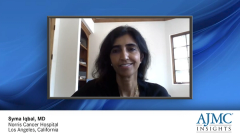
Patient-Support Services and Programs for Patients With Gastroesophageal Cancer
In her final thoughts regarding gastroesophageal cancer, Laura Bobolts, PharmD, BCOP, overviews patient support services and programs.
Episodes in this series

Laura Bobolts, PharmD, BCOP: It’s an exciting time in the landscape of patient-support services for patients with cancer in general, whether they’re patients with upper–GI [gastrointestinal] and esophageal cancer, breast cancer, or lung cancer. A lot of novel digital health care tools are becoming available for our patients with cancer to help them in between their cancer visits. For example, the company I work for is working on a digital health care tool that’s available for patients with cancer. It’s at their fingertips in their home. If a patient is having an adverse effect late on a Sunday night, they can gain real-time access to a human—not a bot—an oncology nurse who knows the patient and their records and what treatments they’re on, and can help them with any symptoms that the patient is having. Or if a patient needs to speak with an oncologist or oncology pharmacist, they can be available to the patient in real time to do a Zoom visit or a chat to help ease the patient’s worries.
Does the patient know that if they received cisplatin, 5-FU [5-fluorouracil], and pembrolizumab, they may have a metallic taste in their mouth? There’s so much that might be part of the education of their chemotherapy and cancer therapy that it’s hard for the patient to grasp all of that material. You need an extra support system for patients between their visits. With this digital tool, we provide symptom management and peer mentorship. Patients with cancer can talk to a patient who has gone through what they have, a cancer survivor who has walked in their shoes. As an oncology pharmacist, I may be more aggressive and say, “Keep going,” because I don’t know exactly what that patient is feeling inside their body. [Patients can] speak with someone who knows what they’re going through.
In addition to unlimited mental health support, it’s important to treat the patient’s mind, body, and soul as they’re going through cancer treatment. It’s an exciting time because we now have digital tools available to patients to help with symptom management and with support in between their cancer care visits with their providers. That’s especially helpful when a patient might live in a rural area and drives hundreds of miles to go to that large cancer center. Now a patient can have the same services that are available at a large cancer center at their fingertips for some of their needs in between their visits.
It’s exciting to see more novel things available for our patients with cancer, and novel ways to communicate with patients. Because who picks up their phone nowadays with a care management program? If I see a phone number and I don’t know who it is, I may not be picking up that call. Something that a patient can engage with on their phone through an application is more what we need—something that’s tailored to the patient and is patient centered vs a cold phone call.
When evaluating new therapies that have the potential to change the landscape of the disease, it would be really helpful to have biomarkers available for patients with cancer so that we can make sure they’re on the right therapy up front that can hopefully target each patient’s unique genetic and molecular signature to provide better outcomes for them. It’s very important to assess the appropriate biomarkers. Even from a payer’s perspective, when you’re doing utilization-management services and looking over covering cancer therapy, from a payer’s side, you need to know what biomarkers to look at. Because what if the provider missed that a patient with gastric cancer was HER2 [human epidermal growth factor receptor 2] positive? Adding trastuzumab to that chemotherapy and possibly even considering the addition of pembrolizumab can improve outcomes for that patient. The biomarkers are key.
From a payer’s perspective, payers need to know oncology and biomarkers so that they can expedite authorizations for our cancer treatments and reduce barriers to access of care, and maybe even expand access and be a second set of eyes on the patient’s care by identifying biomarkers that may have a targeted therapy that the patient could benefit from. Thereafter, they can have an oncologist-to-oncologist discussion about treatment options, similar to a second opinion. It’s a second set of eyes on that patient’s care.
When evaluating new therapies, biomarkers are key. Going forward, real-world data are key. Because once a therapy has been evaluated, we need to see whether outcomes are happening in the real world as they did in the clinical trial. These clinical trials aren’t doing head-to-head evaluations. They’re adding a PD-1 inhibitor to chemotherapy [and comparing it with] chemotherapy, when the standard of care is more likely going to be a PD-1 inhibitor plus chemotherapy in a certain patient population. We don’t have trials that answer the clinical questions we need. From that perspective, we need to lean on real-world data going forward to answer those unanswered clinical questions so that we can try to find out in our unique patient population which regimen is best for each patient with cancer. Hopefully we can improve outcomes for years to come for these patients by tailoring therapy more to their needs. We have the data at our fingertips. We just need to use it.
Transcript edited for clarity.
Newsletter
Stay ahead of policy, cost, and value—subscribe to AJMC for expert insights at the intersection of clinical care and health economics.












